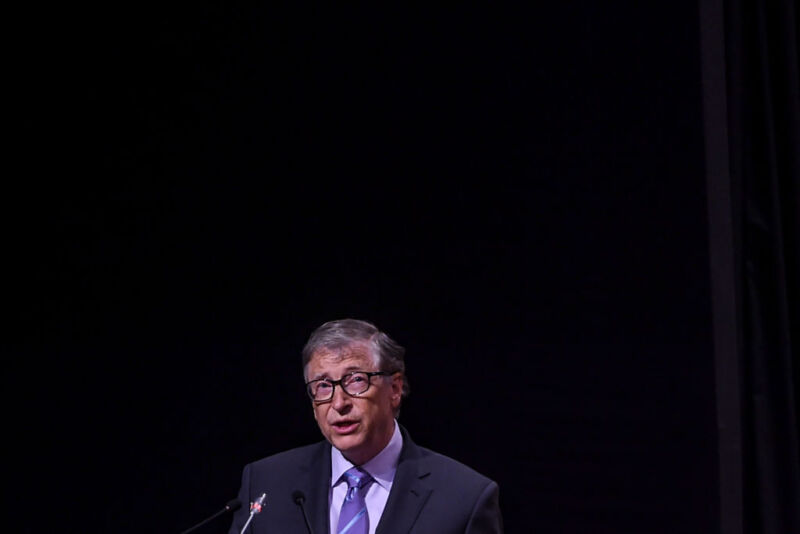
During the pandemic, the richest men in the world added about a trillion dollars to their wealth. The Washington Post reported that SpaceX’s Elon Musk and Amazon’s Jeff Bezos had one-fifth of that in their pockets. But as some billionaires made the pandemic richer, Microsoft co-founder Bill Gates watched the world collapsing around him and decided to create a different business plan.
“I will go down and eventually disappear from the list of the world’s richest people,” Gates declared in a blog, announcing his plan to personally donate money that the annual amount paid out by the Bill & Melinda Gates Foundation to support the global initiatives in the name of progress.
To address global crises that Gates says have been severely exacerbated by the pandemic, “the Gates Foundation plans to increase spending from nearly $6 billion a year before COVID to $9 billion a year by 2026.” The proposed annual budget increase of 50 percent has already been unanimously approved ‘in principle’ by the formal board members of the foundation.
Gates, as one of the world’s richest men, said it is his humanitarian duty to give more.
“The great crises of our time require all of us to do more,” Gates said in a foundation press release announcing his decision. “This is why I’m raising my donation to the Gates Foundation, increasing the payout to $9 billion every year. I hope that by giving more, we can alleviate some of the suffering that people now face and help fulfill the foundation’s vision of giving everyone the opportunity to live healthy and productive lives.”
Gates’ net worth is currently estimated at $102.7 billion. He said he would immediately transfer $20 billion to the Gates Foundation this month, expecting the money to be used to “increase its investments in its existing strategies, including global health and development, gender equality and education, primarily in low-income areas.” — and middle-income countries, in addition to her work in American education and economic mobility.” Combined with a $3.1 billion gift from billionaire Warren Buffett, that brings the Gates Foundation’s current endowment to “about $70 billion.”
For perspective, this means that the Gates Foundation’s current endowment is nearly equal to the amount the foundation has spent since its inception in 2000 ($79.2 billion).
That seems encouraging, but Gates predicts that the need for financing will only increase over time. That’s why, looking to the future, the world’s currently 5 richest man says he plans to act even more drastic than giving away about a fifth of his wealth. To make a lasting impact, he vowed to “give all my wealth to the foundation, except what I spend on myself and my family.”
Throwing money at these problems
Since the start of the pandemic, the Gates Foundation has struggled to fund key COVID response efforts “without taking money away from other important work we fund.”
Gates saw how the foundation has taken immediate action over the past two years to fund the COVID-19 response by allocating “$2.1 billion to gender equality, nearly $1 billion to advance global nutrition and more than $2 billion to tackle the COVID-19 pandemic.” As funds ran out, he worried about diverting funding to research and programs that address long-standing problems, such as fighting “the damage from climate change,” which is “already worse than most models had predicted.”
But at a time when pessimism is on the rise, Gates says his philanthropy helps him “believe that progress is possible.”
The Foundation’s increased annual budget will focus on funding research and development of new programs and technologies in five key areas: pandemic prevention, global health, climate mitigation (and adaptation), education improvement, and food costs.
But even the optimistic billionaire admits that it can still be too little too late, no matter how much money he throws at these problems. “These innovations won’t come in time to completely avoid the problems, but the faster we move, the fewer people will suffer,” Gates said.
In addition to all the money that Gates plans to donate to the foundation in the coming years, he says he will also continue to “give and invest in U.S. healthcare issues” and complementary solutions to climate change (via Gates’ coalition of private investors, Breakthrough Energy) . He says these efforts are likely to generate everlasting wealth. That may stop Gates from really giving all his money away, but he clarified that all proceeds from his ongoing investments would be funneled back into the foundation.
In the US, it looks like philanthropists like Gates will lead the climate change charge as Senator Joe Manchin III (DW. Va.) recently opposed new climate change spending currently under discussion as part of an “economic package” being debated. . Manchin also said he opposes plans in the economic package to raise taxes on the rich. Divisive politics, such as this example, have become increasingly responsible for holding back progress, Gates said.
Gates called it a privilege to invest his personal wealth to face the world’s greatest challenges. In his blog, he seemed to suggest that his plan to remove himself from the list of the world’s richest men—for the first time since the 1980s—would be a worthy goal for any billionaire currently enjoying the tax breaks Manchin has enjoyed so much. vigorously defends. “I hope that others in positions of great wealth and privilege will also rise at this time,” Gates said.

